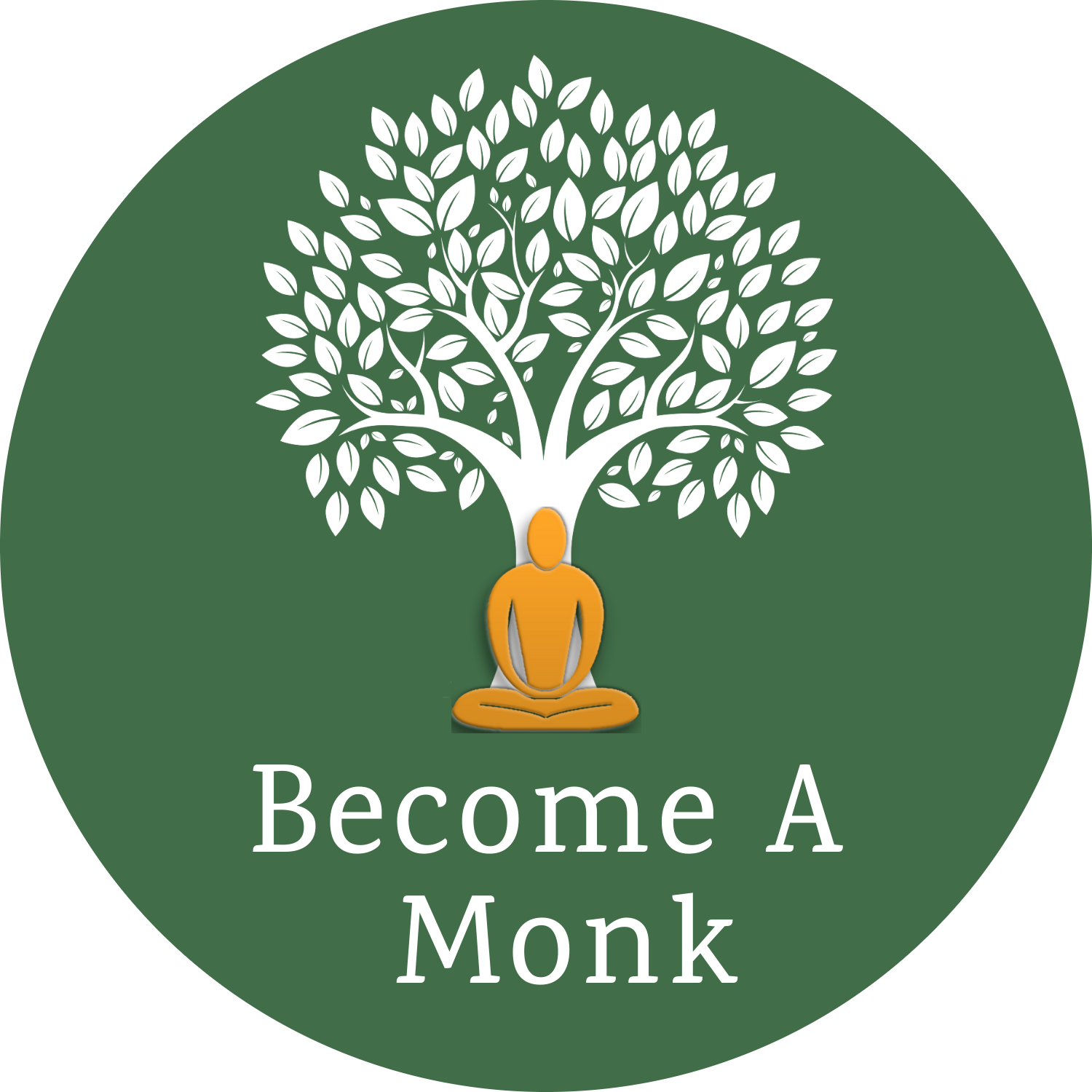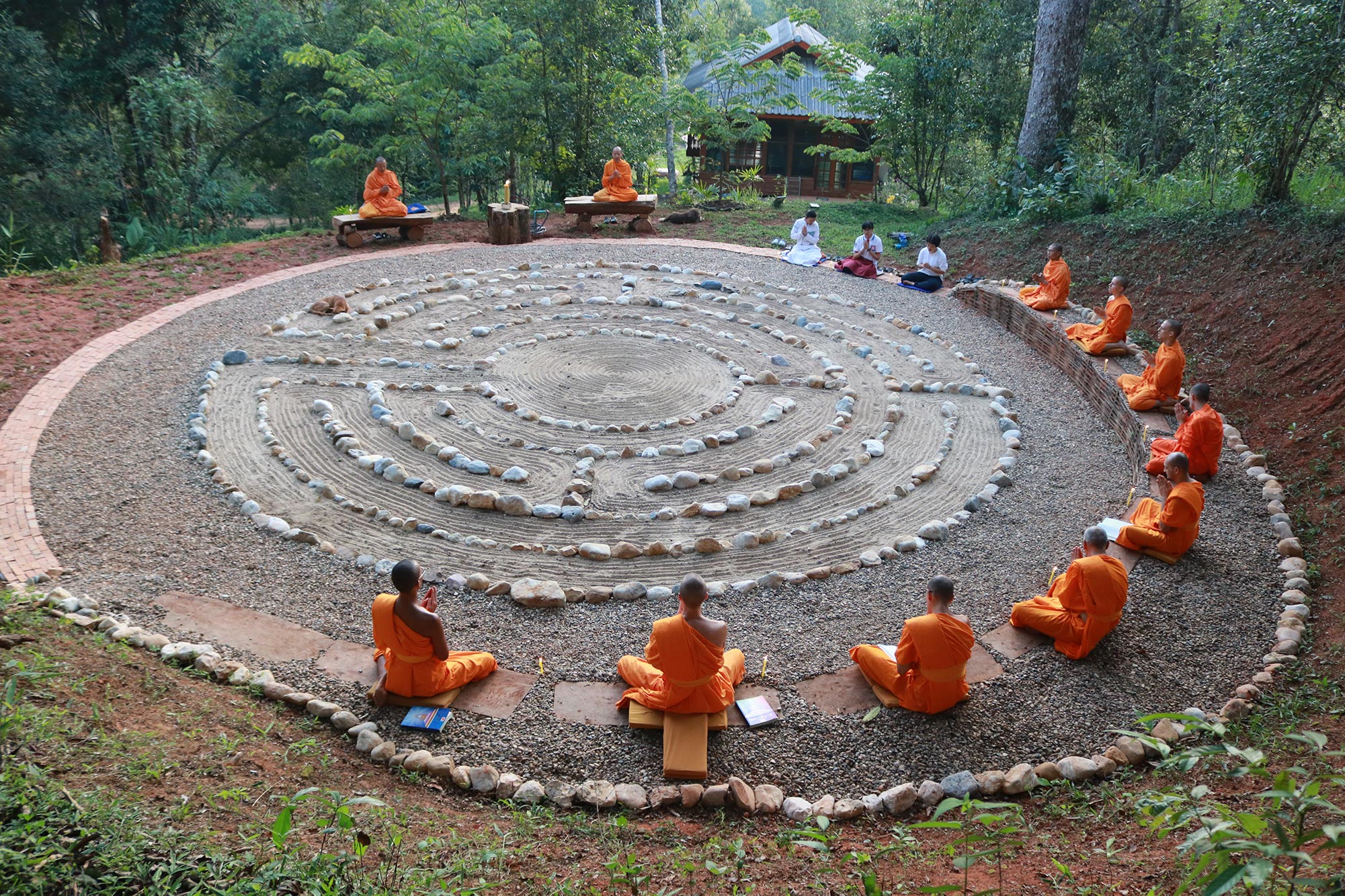Ordaining at Pa Pae is a great opportunity for English-speaking men to get a taste of what it is like to be a Buddhist monk for whatever period of time is most appropriate for that individual, whether that is 2 weeks, 2 months, 2 years, or a lifetime! Nestled in the beautiful mountains of Northern Thailand 1 hour and a half outside of downtown Chiang Mai, the Pa Pae Meditation Retreat has the ideal balance of breathtaking natural surroundings, cool weather, and comfortable accommodations creating a very supportive environment to practice meditation.
For 2024, we will be conducting ordinations every single month. Any man wishing to ordain should arrive no later than the 10th of the month they wish to ordain on, which will give you 5 days to prepare for the ceremony that will take place on the 15th. (If these dates will not work for your schedule, please let us know your specific situation and we can try to accommodate your request)
The rough daily schedule for either of these two options will be as follows:
𝑺𝑪𝑯𝑬𝑫𝑼𝑳𝑬
𝟱:𝟯𝟬𝗮𝗺 – morning chanting/meditation
𝟲:𝟯𝟬𝗮𝗺 – alms round
𝟳:𝟯𝟬𝗮𝗺 – breakfast
𝟵:𝟯𝟬𝗮𝗺 – morning meditation
𝟭𝟭:𝟯𝟬𝗮𝗺 – lunch
𝟯:𝟬𝟬𝗽𝗺 – afternoon group activity (on some days)
𝟲:𝟯𝟬𝗽𝗺 chanting and meditation
While the teaching monks and mentor monks are always happy to answer any questions you have, there will be less emphasis on formal teachings and more time and space to practice and study on your own. If you choose to stay on after the initial month long program, the schedule will be even more open for you to practice as you wish.
Eligibility/Prerequisites
Due to the nature of the training, all applicants must be: male, heterosexual, in good mental and physical health – free from infectious diseases or any physical or mental disability, in good financial standing (able to cover all travel, registration, and other associated costs of program and free from debts or unresolved financial obligations to another person), free from commitments that might cause interruptions during the program, willing to follow all program guidelines and forms of respect and discipline of being a Buddhist monk, and willing to adapt themselves to a community environment.
The individual must have a visa that is valid throughout the program. Before applying, please make sure that you have fully researched the visa/travel process and are confident that you are willing and able to meet the cost requirements and go through the process of obtaining the appropriate visa and entering Thailand. Thank you for your willingness to devote time and effort into educating yourself before asking questions that you can find through the resources we have provided.
In order to ensure your safety, the safety of the other participants and our staff, if you wish to stay on longer term as a monk, we will require you to undergo blood work to check for infectious diseases such as HIV and hepatitis. However, if you only plan to stay short term, then these tests will not be necessary.
Guidelines
A Helpful Mindset to Have
It is important to understand that this is a training program in order to become a monk, and so although meditation is a cornerstone of monkhood, this program is more strict and very different in nature from a meditation retreat. The 8 and 227 precepts are rules of higher spiritual discipline that were established by the Buddha to create an internal and external environment that is conducive for those wishing to develop themselves spiritually. So in order to both support your personal practice and uphold the image of the Sangha, it is important that you maintain humility, patience, an openness to feedback, and a willingness to adjust your habits according to the guidelines of the program and the coaching of the staff. In this way, you can contribute to a quality experience for all.
Respect of Religious/Cultural Customs
Oftentimes people are of the mentality that Buddhism is not a religion. This may be the case for those who apply Buddhist concepts like a philosophy in order to improve their daily life, but it is not the case for becoming a monk. When you become a monk with the Monk Life Project, you are representing Thai Theravada Buddhism. This comes with a set of religious and cultural customs that you are expected to show respect for and abide by. This includes but is not limited to: properly bowing to Buddha images and more senior monks, holding hands in prayer position during blessings, taking off shoes before entering indoor or sacred spaces, not pointing the bottom of your feet towards sacred objects or other monks, taking good care of your robes and folding/wearing them in appropriate manner, not touching the head or shoulders of another monk, etc.
We as the training staff, will guide you on how to follow these religious and cultural customs. It is your job to adjust yourself according to this guidance. It is not necessary to identify as Buddhist in order to become a monk. You can identify as any other religion; however, you must abide by these outward gestures of respect. Not doing so may result in you being dismissed from the program.
8 Precepts
Once you enter the program you will be expected to follow the 8 Buddhist Precepts listed below:
- Refrain from destroying living creatures.
- Refrain from taking that which is not given.
- Refrain from all sexual activity.
- Refrain from incorrect speech.
- Including: untruthful, gossip/divisive, coarse/offensive, and nonsensical speech
- Refrain from intoxicating drinks and drugs which lead to carelessness.
- Including: cigarettes or vapes
- Refrain from eating after midday.
- Refrain from wearing garlands, using perfumes, using cosmetics, dancing, singing, listening to or playing music, and all other forms of engaging in entertainment.
- Refrain from lying down on a high or luxurious sleeping place.
Precepts 6 & 7 are in bold to bring attention to some habits that many people have before becoming a monk. Please prepare yourself not to engage in these activities (and the other 6 activities outlined in the 8 precepts) for the duration of the program.
227 Precepts
After ordination as a monk, you will be expected to follow the 227 Precepts of Buddhist monkhood. However, you are not expected to memorize these rules. The teachings, the structure of the program, and your mentor and teacher monks will help to support and correct you when you make mistakes as you learn and practice these rules.
These rules will guide you towards conducting yourself in a way that is proper and appropriate for a Buddhist monk. Conduct in accordance with these rules will increase your mindfulness, support your meditation, as well as increasing the faith of the lay people who support monks to live this lifestyle.
Conflict
In order to maintain a quality program, you should try your best to avoid all sorts of conflict, arguments, or debates about contentious topics. Of course, disagreements are natural in a community setting, but it is important to respect differences of opinions, not engage or instigate arguments, and try to resolve any issues that arise in a diplomatic and peaceful way. In the event that such a situation arises, it may be best to include a mentor monk to mediate the issue. It is important to note that we have a zero tolerance policy on physical altercations. If you instigate a fight, then you will be asked to leave the program.
Costs
Please be aware, that the Pa Pae Meditation Retreat will NOT provide any form of financial aid regarding travel costs or any other costs within the program. Before joining this program, you must be in a stable enough financial situation to cover all of the following associated costs independently:
- Registration fee : 5,000 THB in cash
- Travel Costs including but not limited to: Visa, Passport, Plane Tickets (you must have enough for return ticket as well)
- Blood work (for long term members only)(can be done at local hospital. we can help coordinate)
- Any other costs incurred outside of the program dates
The registration fee will cover the ordination fee, food, accommodation, clothes, basic necessities, basic living costs, and various items that you will be able to use during the program. Outside of this, it is best to have a decent amount of money in savings in case of any emergencies.
Please note that if you decide to stay a monk longer term, then the Pa Pae Meditation Retreat will help cover the costs of your visa extensions.
Registration
What to Submit
- Registration fee : 5,000 THB in cash
What the Pa Pae Meditation Retreat Will Provide You With
- Sleeping Supplies: sleeping bag/pillows/blankets
- Office Supplies: pens, notebooks
- Clothes: 2 white shirts, 2 white pants (to be worn for first 5 days before ordination), and warm clothes including orange long sleeve shirts, beanie(warm cap) and socks.
- Toiletries: toothpaste, soap, shampoo (we typically have such toiletries in stock, but you are welcome to bring the brands that you prefer)
Personal Items You Can Bring/Use
- Personal sandals – must be open toed and not covering the heel(monks are not allow to wear shoes with straps around or covering heal). Please bring sandals that are of a single color: either brown, grey, or dark blue. Please make sure that your sandals are both durable and broken in.
- Personal medication
- Personal toiletries (razor, soap, toothbrush, etc. )
- Warm clothing (during the months of October – March) – chances are it will be cold during the night/morning time (sometimes less than 10 degrees Celsius) so you may bring your thermal undershirts, long Johns, a scarf, socks, etc. to wear especially while sleeping. Please avoid bringing clothes that are exceedingly vibrant, have patterns, or are black. Warm colors like orange, yellow, darker red, or nude colors like white/tan/brown would be best. During the day, we ask that you wear the warm clothes that we provide if you feel that you need the extra warmth. We do however ask that you wear the orange hat we provide (if at all) and the orange long sleeve shirt that we provided on top of any warm shirts that you bring.

